The image of the Earth filled the interoceptor. As the planet spun imperceptibly below, the ship's Captain pondered his strategy. His reverie was broken by the droll voice of his vice commander.
"The field team's report has arrived."
If the alien captain had known what a dishrag was, he would've thought it a fitting description for his underling's personality. "Okay, whattya got for me?"
"There exists on the planet a species of hairless, barking primates who rather enjoy sitting and staring at phosphorescent screens for long periods of time. They also like to engage in contests of strength and dominance when they're not stimulating themselves to images of nude members of their species."
 The alien captain shrugged. Who didn't like to whip the shelyack every once in a while? "Has this species modeled threats posed by space invaders?"
The alien captain shrugged. Who didn't like to whip the shelyack every once in a while? "Has this species modeled threats posed by space invaders?"
"Yes..."
The captain leaned ever so slightly in the direction of his subordinate, expecting a sentence that never came. "And?"
The visibly distracted lackey replied, lost in the game, "It's an entertaining diversion. These little blocky things come down the screen and you shoot at them with non-nutritive pellets."
The captain was intrigued. "And then what?"
"That's it."
"You mean you just shoot at lines of aliens and that's it? What happens if you kill them all?"
"Oh, more come and you keep shooting at them."
The captain nodded, deep in thought. This species was well-versed in futility. It would fight until crushed by the relentless cha-cha of his alien horde. Still, he needed more information. "Are there any other strategies the barking apes may have employed against a spaceborne threat?"
The vice commander nodded. "Of course. Our field agents have viewed several media on the matter and presented us with a list representing the typical plans of attack the monkeymen expect to confront."
"Okay, show them to me."
The interocetor shimmered and displayed a black-and-white film with a giant robot standing on a ramp.
"Are these fuckers color blind or something?" the captain asked.
"No sir, everything on this world was apparently monochrome until 40 years ago, although many of this species now consider its use to be 'arty'." 
"Whatever, keep going."
The robot shot a death ray at the assembled military vehicles, causing them to disappear. The captain especially liked that part, but quickly grew tired about some plot to kill the curiously ape-like alien and the female's relationship with him. He was about to fall asleep until the robot appeared, ready to kill the female. The captain sat upright in his chair, waiting for the deathblow when the female uttered some code phrase. The robot stopped and the movie ended.
"What the hell was that? She says some shit about Kudzoo's borrowed necktie and it stops? What the hell was the name of this?"
"The Time Period When the Planet Ceased Rotating."
"Never show that again, but get me one of those death rays. That was some cool shit right there."
"Very well. Next is a moving picture where the space people are presented as benevolent beings spreading peace and love."
The captain groaned. Sure, people are going to expend all their time and energy crossing the vast gulfs between the stars just to say "What up?" and leave. "Please don't tell me the rest are like this, because if they are, we might as well just blow up some prominent landmarks and pose as their gods."
"Actually, something like that is coming up, but this is the only story about nice aliens we could find."
That pleased the captain, but still, there was the principle of the thing to consider. "I mean, isn't there at least one scene where a scientist tries to make peace with the alien and it rips out the fucker's internal organs and feasts upon them while howling at a large, well-lit natural satellite?"
"No sir, but our agents did find several films with that theme, so there is yet hope."
The captain shrugged his shoulders. "Roll film."
In this movie, the aliens compelled people to carve geological formations with their mashed potatoes, before moving on to more complex feats of sculpture involving lawn ornaments and massive amounts of dirt.  The captain was just about to fall asleep when the humans began a disco contest with the aliens, matching the mothership beat for beat with their pimped out casio keyboard and expensive light show.
The captain was just about to fall asleep when the humans began a disco contest with the aliens, matching the mothership beat for beat with their pimped out casio keyboard and expensive light show.
The captain turned and faced his lackey. "You didn't tell me this was a musical!"
The vice commander shook his head, "It's not. We think this was included to capitalize on a musical craze sweeping the planet at the time. There's no other rational explanation for it."
The captain pop-and-locked in his chair, digging the funky beats until it was clear the the alien mothership possessed mad DJ skillz that far outclassed the puny humans' effort. The captain couldn't contain his enthusiasm. "Bah-diddy-bomp-buh-bomp mothahfuckah!"
Suddenly, the aliens revealed themselves. They were cute little pale folk led by some gangly, bug-eyed creature. The captain thought they looked tasty. Then he had an idea -- a most wonderful idea! "Maybe we can go down there and pretend to be these cool little fuckers, then when all the idiots are gathered before us, we open up the ship and eat them."
"Very good, sir."
"You know what? Fuck that. Let's find out if these little bastards exist and hit their planet. They look like they know how to throw a party. We could get good and shit-faced with these wee tots."
"As you wish."
"And then we can eat them."
"Of course, sir.  Next is a film where the creators took the best of all the better alien invasion movies and tossed them all into one film. It's called Independence Day."
Next is a film where the creators took the best of all the better alien invasion movies and tossed them all into one film. It's called Independence Day."
"Eh, I've heard about this one. Just show the part where everything gets blown up."
The captain's favorite part came on. In front of a massive alien ship was a lone flying machine outfitted with disco lights. The captain privately lamented the decline of this species' appreciation for a good multi-colored light show before the whirlybird got blowed up. After humanity had been destroyed , the captain took a bathroom break and returned a short time later to see the end of the film. Two of the monkeymen had infiltrated the alien ship and were playing with a toy aboard a captured fighter.
The captain was confused. "What the hell are they doing?"
"The best we can determine is that they're transferring some sort of digital information to the invader's ship to incapacitate it."
"O RLY?"
"YA RLY"
"That's the dumbest thing I've ever heard." The captain paused a moment. "You think they could do that to us?"
"Not unless they've invented a way to incorporate bigger, dirtier beats in their wangdoodles."
The captain laughed.  "No shit. Hey listen, this is starting to get boring, so why don't we just wrap this up?"
"No shit. Hey listen, this is starting to get boring, so why don't we just wrap this up?"
"Very well, sir."
The captain looked around, seeking inspiration. "Maybe we could exterminate random insect species or increase their global temperature just to fuck with them."
"I don't think that would work. They're not the sharpest knives in the drawer."
"Hmm, okay." Something caught the captain's eye. It was something he hadn't used in years, but the novelty of the act intrigued him. It was originally used to scavenge coolant from the ship's system into an awaiting mouth to be ingested. The effect was intoxicating, but as the captain regarded the tube and thought about the monkeymen's anatomy, he happened upon a new use for the coolant bong.
He picked up the bong and showed it to his vice commander. "Why don't we just go down there and shove this up someone's ass, then take-off for nachos or something?"
"Sounds like a plan."
As the two readied to depart the ship, the captain felt an upwelling of pride. Well, it may have been that plate of gronash he had earlier, but he decided it was pride. His digestive system begged to differ, but the captain had already had this argument numerous times with his nutrient sac and had always come out on top. At any rate, he loved his work. What other job in the galaxy afforded a working stiff the opportunity to travel billions of miles to some insignificant backwater and shove a coolant tube up some primate's ass?
"I can't believe I get paid to do this."
A few minutes later, Jeff Tessman from Dung Hill, Idaho was awakened by a bright light in his window. He looked at the foot of his bed and before him stood two aliens. One was holding what appeared to be a probe of some kind. He instinctively moved his hand to cover his anus, but was immediately immobilized.
"Oh no, not again."
Don't blame Paul. He voted for Kodos.
Archives
Think about it. Anders I can see. He has no real back story. The same goes for the President's aide. Tyrol's been freaking out that he's a cylon for the last two years. In fact, there was a little incident that took place in last season's finale where he beats the shit out of his future wife, because he's "under stress" or some nonsense. It was forgotten after all the New Caprica crap, as if the writers said, "Well, that was fucking stupid. Let's forget about it."
 With everything resolved, there was nothing for the team to do in Season 8. In fact, Richard Dean Anderson (Col. Jack O’Neill) had been reducing his commitment to the the series for the last couple of seasons and wanted even more time off to spend with his family. Combined with the departure of Don S. Davis (General Hammond), the writers resolved the dilemma by promoting Anderson’s character to General and putting him in charge of Stargate Command (SGC). This broke-up the successful team dynamic that had been in play for the previous seven seasons, leaving a team of three members with nothing to do.
With everything resolved, there was nothing for the team to do in Season 8. In fact, Richard Dean Anderson (Col. Jack O’Neill) had been reducing his commitment to the the series for the last couple of seasons and wanted even more time off to spend with his family. Combined with the departure of Don S. Davis (General Hammond), the writers resolved the dilemma by promoting Anderson’s character to General and putting him in charge of Stargate Command (SGC). This broke-up the successful team dynamic that had been in play for the previous seven seasons, leaving a team of three members with nothing to do. , and adapting a strategy geared toward long-term success that exploited opportunities as they arose. They certainly didn’t focus every season looking for a magic bullet to defeat the Goa’uld at the end of the season.
, and adapting a strategy geared toward long-term success that exploited opportunities as they arose. They certainly didn’t focus every season looking for a magic bullet to defeat the Goa’uld at the end of the season. The book opens with Shadow, a man released on parole after serving three years in jail for assault. He finds out his wife is dead and meets a mysterious stranger named Mr. Wednesday, who offers him a job as a bodyguard. So begins Shadow's adventure amongst the gods as Wednesday tries to bluff and con his way into starting a war between the old gods and the new. The gods Shadow meets are mere shadows of their former selves, old and sickly. There's no one left to worship them, so they get by doing odd jobs and turning to crime. They often lament that "this is not a good land for gods," as the people tend to adopt and forget their gods with every generation.
The book opens with Shadow, a man released on parole after serving three years in jail for assault. He finds out his wife is dead and meets a mysterious stranger named Mr. Wednesday, who offers him a job as a bodyguard. So begins Shadow's adventure amongst the gods as Wednesday tries to bluff and con his way into starting a war between the old gods and the new. The gods Shadow meets are mere shadows of their former selves, old and sickly. There's no one left to worship them, so they get by doing odd jobs and turning to crime. They often lament that "this is not a good land for gods," as the people tend to adopt and forget their gods with every generation. Even the neo-pagan movement gets a bit of a ribbing in Gaiman's book. A waitress professes to be a pagan, prompting Odin to ask which pantheon she worships. When she answers "all of them, I guess", Odin asks whose shrine is in her home and what animal she sacrifices to her god. The girl can't answer. Odin makes clear that she's not actually worshiping anything but old fairy tales. The gods were real to the people who worshiped them. Their fortunes rose and fell with their gods and proper rituals had to be obeyed to ensure the continued survival of the tribe. In Gaiman's book, the gods feed on worship, but he alludes to a time when the gods demanded much more. You may have read about the "nectar of the gods" or "Soma" or some other type of mystical food or drink that sustained the gods. These foods were essentially distilled belief, from which the gods derived their nourishment. Other cultures sacrificed animals, whose blood sated the god's wrath and earned the people the god's favor for a period of time. The earliest and most primitive human cultures offered their gods the most potent sacrifice of all: Man. If you really wanted to show a god you cared, you sacrificed a human to it. Blood nourished the gods. Even the Christian god demanded a blood sacrifice to forgive the people's sins against it, though fortunately it was a one time deal. In a clever twist, Christians metaphorically drink the blood of the human sacrifice, deriving spiritual sustainment from it. The nectar of a god now sustains Man.
Even the neo-pagan movement gets a bit of a ribbing in Gaiman's book. A waitress professes to be a pagan, prompting Odin to ask which pantheon she worships. When she answers "all of them, I guess", Odin asks whose shrine is in her home and what animal she sacrifices to her god. The girl can't answer. Odin makes clear that she's not actually worshiping anything but old fairy tales. The gods were real to the people who worshiped them. Their fortunes rose and fell with their gods and proper rituals had to be obeyed to ensure the continued survival of the tribe. In Gaiman's book, the gods feed on worship, but he alludes to a time when the gods demanded much more. You may have read about the "nectar of the gods" or "Soma" or some other type of mystical food or drink that sustained the gods. These foods were essentially distilled belief, from which the gods derived their nourishment. Other cultures sacrificed animals, whose blood sated the god's wrath and earned the people the god's favor for a period of time. The earliest and most primitive human cultures offered their gods the most potent sacrifice of all: Man. If you really wanted to show a god you cared, you sacrificed a human to it. Blood nourished the gods. Even the Christian god demanded a blood sacrifice to forgive the people's sins against it, though fortunately it was a one time deal. In a clever twist, Christians metaphorically drink the blood of the human sacrifice, deriving spiritual sustainment from it. The nectar of a god now sustains Man.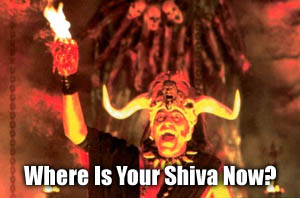 But what can sustain these old gods as they battle the new? How can gods whom no one worships defeat those who enjoy the adoration of the masses? Gods may not be real, but what is a god but an idea? Ideas have power, but only if they have champions to fight on their behalf. The gods are nothing without Man. America is a land of ideas, all jostling for prominence and attention. Gods, being mere ideas, must compete for attention within the frothing roil of American culture. Gaiman touches upon this theme in an off-hand manner, but I don't think he really gets what makes America tick. Sure, we have our religious types who put their god above the State, but at least they recognize the existence of the secular State. In the Old World, the gods ran things. Their agents on Earth were the State. To remove the gods was to remove the State. Competing ideas were treason; worse, they could be a cancer that brought down a nation from within. Even with our ignorant and superstitious folk, we're still a land of transient ideas, some of which may seize the popular imagination for a little while before being discarded for the next hot, new thing, but at least we can offer new ideas without destroying the cosmic order. As for the gods? Well, with the free market, technology, and the pursuit of happiness, we really only have room for one ethereal god, and he's got market share that even Bill Gates would kill for. The most any upstart can hope for is to be the Linux of the gods.
But what can sustain these old gods as they battle the new? How can gods whom no one worships defeat those who enjoy the adoration of the masses? Gods may not be real, but what is a god but an idea? Ideas have power, but only if they have champions to fight on their behalf. The gods are nothing without Man. America is a land of ideas, all jostling for prominence and attention. Gods, being mere ideas, must compete for attention within the frothing roil of American culture. Gaiman touches upon this theme in an off-hand manner, but I don't think he really gets what makes America tick. Sure, we have our religious types who put their god above the State, but at least they recognize the existence of the secular State. In the Old World, the gods ran things. Their agents on Earth were the State. To remove the gods was to remove the State. Competing ideas were treason; worse, they could be a cancer that brought down a nation from within. Even with our ignorant and superstitious folk, we're still a land of transient ideas, some of which may seize the popular imagination for a little while before being discarded for the next hot, new thing, but at least we can offer new ideas without destroying the cosmic order. As for the gods? Well, with the free market, technology, and the pursuit of happiness, we really only have room for one ethereal god, and he's got market share that even Bill Gates would kill for. The most any upstart can hope for is to be the Linux of the gods. The two biggest sci-fi shows to emerge in the late 70s were Battlestar Galactica and Buck Rogers in the 25th Century. Galactica was coolness incarnate, especially if you were a kid. It had a thundering theme song that left no doubt in your mind that Lorne Greene was about to do some epic shit with his ragtag fleet. It was an upbeat march that was both triumphant and hopeful. There's no muted, mournful wail of regret and loss to be found where Lorne Greene treads. When you hear Galactica's theme song, you don't think, "Hmm, I guess I better settle down for an hour of nihilistic romp and drunken regret." Aw hell, no. that's not how we rolled. When the final notes of that theme song were still echoing in your ears, you knew that it was time to strap your ass in, hit the Turbo, and kick some Cylon cans back to their old and busted Base Stars.
The two biggest sci-fi shows to emerge in the late 70s were Battlestar Galactica and Buck Rogers in the 25th Century. Galactica was coolness incarnate, especially if you were a kid. It had a thundering theme song that left no doubt in your mind that Lorne Greene was about to do some epic shit with his ragtag fleet. It was an upbeat march that was both triumphant and hopeful. There's no muted, mournful wail of regret and loss to be found where Lorne Greene treads. When you hear Galactica's theme song, you don't think, "Hmm, I guess I better settle down for an hour of nihilistic romp and drunken regret." Aw hell, no. that's not how we rolled. When the final notes of that theme song were still echoing in your ears, you knew that it was time to strap your ass in, hit the Turbo, and kick some Cylon cans back to their old and busted Base Stars. leaving only tiny rag-tag fleet to flee the cylon tyranny. The only other place in the galaxy with humans was Earth, yet Galactica regularly found planets with humans running all over the place. There was a Wild West Planet, as well as an almost identical planet called Terra. Neither of these were Earth, but they were habitable, they had functioning human societies, and they were outmatched by Galactica's mighty power. Yet Galactica would always move on at the end of the episode, looking for that shining beacon in the night. If I were Starbuck or Apollo, I think I would've just lied about it. When Adama asks if this is indeed the Earth of legend, I'd just look around, shrug my shoulders and report, "Uh, yeah. Yeah, it's Earth all right. No doubt about it." But heroes didn't lie in the 70s, so they were stuck trying to find that one special planet amongst the teeming multitude of humanity. When they finally did find it, it was really lame and they all had super powers. They also didn't become the gods of ancient legend. Bummer.
leaving only tiny rag-tag fleet to flee the cylon tyranny. The only other place in the galaxy with humans was Earth, yet Galactica regularly found planets with humans running all over the place. There was a Wild West Planet, as well as an almost identical planet called Terra. Neither of these were Earth, but they were habitable, they had functioning human societies, and they were outmatched by Galactica's mighty power. Yet Galactica would always move on at the end of the episode, looking for that shining beacon in the night. If I were Starbuck or Apollo, I think I would've just lied about it. When Adama asks if this is indeed the Earth of legend, I'd just look around, shrug my shoulders and report, "Uh, yeah. Yeah, it's Earth all right. No doubt about it." But heroes didn't lie in the 70s, so they were stuck trying to find that one special planet amongst the teeming multitude of humanity. When they finally did find it, it was really lame and they all had super powers. They also didn't become the gods of ancient legend. Bummer. Does Buck Rogers hold up? Not so much. I really couldn't make it through an episode. I mean, there's cheesy, and then there's just bad. The costumes sucked. Well, the ladies evening gowns were quite well designed, especially those worn by hottie space princesses and Erin Gray. The men's outfits were embarassing. If Gil Gerrard gained 16 ounces, his suit would've torn in 16 different places. The spaceships really sucked, which I guess is why we never spent hours trying to draw a perfect Buck Rogers ship. Not like we did with Vipers. In my school, you were considered the shit if you could draw a really cool Viper. Nobody drew Buck Rogers' ship, although I think a few of the older kids traced the lovely outlines of Erin Gray on more than one desktop.
Does Buck Rogers hold up? Not so much. I really couldn't make it through an episode. I mean, there's cheesy, and then there's just bad. The costumes sucked. Well, the ladies evening gowns were quite well designed, especially those worn by hottie space princesses and Erin Gray. The men's outfits were embarassing. If Gil Gerrard gained 16 ounces, his suit would've torn in 16 different places. The spaceships really sucked, which I guess is why we never spent hours trying to draw a perfect Buck Rogers ship. Not like we did with Vipers. In my school, you were considered the shit if you could draw a really cool Viper. Nobody drew Buck Rogers' ship, although I think a few of the older kids traced the lovely outlines of Erin Gray on more than one desktop.  So there you have my flashback to 70s sci-fi. The production values have improved, the acting is a little bit more natural, but we've lost a lot of that happy-go-lucky attitude and objectification of naturally curvy women that made the 1970s so endearing. It was a time when the good guys didn't torture people, Lorne Greene made the right choices, and people took responsibility for their actions. You sure as hell wouldn't find Apollo blaming the media or the Capricans for the colonial fleet's failure to prevent the Cylon attack, that's for sure. Heroes didn't do that back then. They went on adventures, chasing after lusty, busty women and performing amazing feats of derring-do. For all the realism and nuance present in today's sci-fi, I think I'd rather fly on Lorne Greene's Galactica than the emo ship of drunks held together by Edward James Olmos' shear force of will. Those '78 Galacticans knew how to party.
So there you have my flashback to 70s sci-fi. The production values have improved, the acting is a little bit more natural, but we've lost a lot of that happy-go-lucky attitude and objectification of naturally curvy women that made the 1970s so endearing. It was a time when the good guys didn't torture people, Lorne Greene made the right choices, and people took responsibility for their actions. You sure as hell wouldn't find Apollo blaming the media or the Capricans for the colonial fleet's failure to prevent the Cylon attack, that's for sure. Heroes didn't do that back then. They went on adventures, chasing after lusty, busty women and performing amazing feats of derring-do. For all the realism and nuance present in today's sci-fi, I think I'd rather fly on Lorne Greene's Galactica than the emo ship of drunks held together by Edward James Olmos' shear force of will. Those '78 Galacticans knew how to party.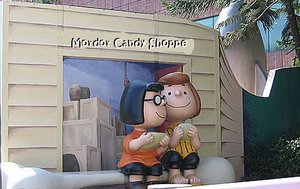
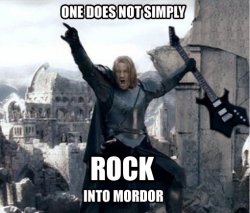 Anyway, they eventually make it to Riverdale, where the Reverend Jim Ignatowski, lately suffering from a stroke, holds court. Everyone from New York to East California is assembled to hear him speak. In an uncomfortable and awkward speech, he finally manages to tell the assembled guests that this guy's wedding ring needs to be destroyed, because the chick this guy was married to was a real bitch and he's better off without her, but the guy can't let go, so he's continually looking for his ring so he can pretend it's like the good old days. Borimir wonders if he can't take the ring and pawn it. After all, one does not simply rock into Mordor. Sam Clemens says no and launches into a humurous tale of Elves and Dwarves roughing it in the Gray Havens. He also declares the Dwarves to be the missing link between man and ape. A racial slur is used to provide local color.
Anyway, they eventually make it to Riverdale, where the Reverend Jim Ignatowski, lately suffering from a stroke, holds court. Everyone from New York to East California is assembled to hear him speak. In an uncomfortable and awkward speech, he finally manages to tell the assembled guests that this guy's wedding ring needs to be destroyed, because the chick this guy was married to was a real bitch and he's better off without her, but the guy can't let go, so he's continually looking for his ring so he can pretend it's like the good old days. Borimir wonders if he can't take the ring and pawn it. After all, one does not simply rock into Mordor. Sam Clemens says no and launches into a humurous tale of Elves and Dwarves roughing it in the Gray Havens. He also declares the Dwarves to be the missing link between man and ape. A racial slur is used to provide local color.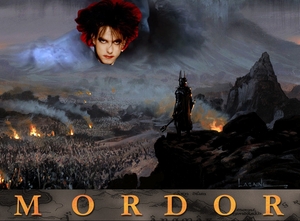
 I think what pissed me off most about the show was the complete disregard for pacing and characterization displayed by the writers. For some reason, they've decided that every show must have flashbacks, whether or not those flashbacks have anything to do with the character's current plight. But why have flashbacks anyway? They're a fine device at the beginning of the series featuring a bunch of strangers on a plane that had just crashed on an island. It's natural to explore who these people are and where they came from. The flashbacks also provided a nice foil for whatever was currently vexing the character, but now they just get in the way of good character development and bring the show to a screeching halt as soon as you hear that whoosh. We already know who these people are and they're associated foibles. Why can't we concentrate on what's happening to them now? I mean, if they keep with the damned flashbacks long enough, they're going to have to start flashing back to the first season. Just drop it and get with moving the plot along.
I think what pissed me off most about the show was the complete disregard for pacing and characterization displayed by the writers. For some reason, they've decided that every show must have flashbacks, whether or not those flashbacks have anything to do with the character's current plight. But why have flashbacks anyway? They're a fine device at the beginning of the series featuring a bunch of strangers on a plane that had just crashed on an island. It's natural to explore who these people are and where they came from. The flashbacks also provided a nice foil for whatever was currently vexing the character, but now they just get in the way of good character development and bring the show to a screeching halt as soon as you hear that whoosh. We already know who these people are and they're associated foibles. Why can't we concentrate on what's happening to them now? I mean, if they keep with the damned flashbacks long enough, they're going to have to start flashing back to the first season. Just drop it and get with moving the plot along. Speaking of the "Resistance", what makes BSG great is how they can change one little word and completely throw your perceptions out of whack. The audience obviously identifies with the humans, so their sympathies lie with them. Since Our Heroes are currently under the occupation of an evil force, we naturally cheer them on as they fight back against the aggressor. Here's where synonyms and their connotations come into play. When Americans hear the word "Resistance", they tend to have romantic notions about French or Polish freedom fighters resisting Nazi occupation. The word has a positive meaning. But the writers decided to start calling our plucky heroes "insurgents". Insurgents? Wait a minute, that's what we call the people in Iraq who are fighting us. So if the Cylons are calling it an insurgency and we use the same word, then that would make us...oh, I see what you did there. By simply exchanging one synonym for another, the audience is forced to see the battle from both sides: as Occupier and Occupied. We want to root for the humans, but they're using the same tactics that our real world enemies use and we despise. We don't want to identify with the Cylons because they're Evil, but they're having to deal with the same things that we have to deal with in real life, so it's hard not to sympathize with their situation, even though we never want to see ourselves as an Occupier. We like to think we're doing those people a favor, but the Cylons thought they were doing the same thing, too.
Speaking of the "Resistance", what makes BSG great is how they can change one little word and completely throw your perceptions out of whack. The audience obviously identifies with the humans, so their sympathies lie with them. Since Our Heroes are currently under the occupation of an evil force, we naturally cheer them on as they fight back against the aggressor. Here's where synonyms and their connotations come into play. When Americans hear the word "Resistance", they tend to have romantic notions about French or Polish freedom fighters resisting Nazi occupation. The word has a positive meaning. But the writers decided to start calling our plucky heroes "insurgents". Insurgents? Wait a minute, that's what we call the people in Iraq who are fighting us. So if the Cylons are calling it an insurgency and we use the same word, then that would make us...oh, I see what you did there. By simply exchanging one synonym for another, the audience is forced to see the battle from both sides: as Occupier and Occupied. We want to root for the humans, but they're using the same tactics that our real world enemies use and we despise. We don't want to identify with the Cylons because they're Evil, but they're having to deal with the same things that we have to deal with in real life, so it's hard not to sympathize with their situation, even though we never want to see ourselves as an Occupier. We like to think we're doing those people a favor, but the Cylons thought they were doing the same thing, too. But why focus on the future when the present has so much to offer? Especially one that offers us Hiro Nakamura, the stand-in for every teenage boy who wished he could do neat stuff and be a hero. Hiro's genuine enthusiasm and sense of mission really make this show. We've already caught a glimpse of future Bad-Ass Hiro with a sword, so seeing how he goes from excited guy who can't control his powers to a katana-wielding bad-ass with a perfect command of the English language will be interesting. The best line of the season is when the Mopey Guy tells Hiro that he met future Hiro who had a sword. Hiro's reaction is priceless: "I had a sword?" Turns to friend: "I had a sword!" I think any number of geeks out there would've reacted the same way and that's what makes this show so fun. You can see yourself in a lot of these people because they're not lawyers or millionaire playboys. They're like us and people we know.
But why focus on the future when the present has so much to offer? Especially one that offers us Hiro Nakamura, the stand-in for every teenage boy who wished he could do neat stuff and be a hero. Hiro's genuine enthusiasm and sense of mission really make this show. We've already caught a glimpse of future Bad-Ass Hiro with a sword, so seeing how he goes from excited guy who can't control his powers to a katana-wielding bad-ass with a perfect command of the English language will be interesting. The best line of the season is when the Mopey Guy tells Hiro that he met future Hiro who had a sword. Hiro's reaction is priceless: "I had a sword?" Turns to friend: "I had a sword!" I think any number of geeks out there would've reacted the same way and that's what makes this show so fun. You can see yourself in a lot of these people because they're not lawyers or millionaire playboys. They're like us and people we know.

 You can never go home again -- especially if you're a soldier traveling at relativistic speeds and fighting a thousand-year war. This is not only one of the best sf books ever written, it's also one of the best war novels ever written. I'm not a fan of most military fiction, normal or sci-fi, because it usually focuses on the gee-whiz aspects of war: the toys and the tactics. No one ever focuses on what it really feels like, but Haldeman, himself a Viet Nam vet, captured the weird disconnect someone feels when they've not only been away from home for a long time, but they've participated in things that no one back home can relate to. Haldeman uses time dilation as a device to exaggerate the feeling, but it doesn't diminish its authenticity. The main character, Mandella, does what a lot of people who find that they no longer fit in with "the world" do: he re-ups and basically spends the remainder of his life fighting and living in an unchanging reality with the only other people he can relate to -- his fellow vets. The book also features a thread about the way military folk are often viewed and treated by the higher-ups: basically as pieces of expendable, thinking meat. If you've ever heard the phrase, "I need a body for (insert task)", then you'll get the mindset that Haldeman explores in the novel.
You can never go home again -- especially if you're a soldier traveling at relativistic speeds and fighting a thousand-year war. This is not only one of the best sf books ever written, it's also one of the best war novels ever written. I'm not a fan of most military fiction, normal or sci-fi, because it usually focuses on the gee-whiz aspects of war: the toys and the tactics. No one ever focuses on what it really feels like, but Haldeman, himself a Viet Nam vet, captured the weird disconnect someone feels when they've not only been away from home for a long time, but they've participated in things that no one back home can relate to. Haldeman uses time dilation as a device to exaggerate the feeling, but it doesn't diminish its authenticity. The main character, Mandella, does what a lot of people who find that they no longer fit in with "the world" do: he re-ups and basically spends the remainder of his life fighting and living in an unchanging reality with the only other people he can relate to -- his fellow vets. The book also features a thread about the way military folk are often viewed and treated by the higher-ups: basically as pieces of expendable, thinking meat. If you've ever heard the phrase, "I need a body for (insert task)", then you'll get the mindset that Haldeman explores in the novel. I have a soft spot for the Foundation series (yes, even the later ones). Asimov's great gift was his ability to tell large, complex stories in a simple (but not simplistic!) style. His writing is so clean and smooth that your eyes slip off the page. He never needlessly complicated the text by including archaic or obscure words, as some authors do to impress us with their ability to read a thesaurus. He also communicated great ideas with a great economy of text. Contrast this to modern authors, who feel that a thought is only as deep as the amount of verbiage used to express it. With Asimov, you never find yourself skipping page after page of filler to get back to the plot.
I have a soft spot for the Foundation series (yes, even the later ones). Asimov's great gift was his ability to tell large, complex stories in a simple (but not simplistic!) style. His writing is so clean and smooth that your eyes slip off the page. He never needlessly complicated the text by including archaic or obscure words, as some authors do to impress us with their ability to read a thesaurus. He also communicated great ideas with a great economy of text. Contrast this to modern authors, who feel that a thought is only as deep as the amount of verbiage used to express it. With Asimov, you never find yourself skipping page after page of filler to get back to the plot.
 Red Mars is the first in a trilogy describing human colonization and terraforming of Mars. Of the three, Red Mars is the best, mostly because of its realism and Robinson's ability to present different points of view equally well. There's none of Heinlein's wanking in these books, which are told from different points of view and represent what will likely be the debates surrounding the colonization of Mars. Some believe it should be kept in its pristine state while others encourage full-bore terraforming. Even though the mission calls for strict adherence to Earth's guidelines, the 100-person crew quickly fragments and starts doing their own thing. They eventually become the leaders of the various factions on Mars, and much of the rest of the book explores the consequences of the First Hundred's decisions. Some live, others die, but all are profoundly changed by the rapid colonization and terraforming of the planet, as well as an increasingly over-populated and creaking Earth.
Red Mars is the first in a trilogy describing human colonization and terraforming of Mars. Of the three, Red Mars is the best, mostly because of its realism and Robinson's ability to present different points of view equally well. There's none of Heinlein's wanking in these books, which are told from different points of view and represent what will likely be the debates surrounding the colonization of Mars. Some believe it should be kept in its pristine state while others encourage full-bore terraforming. Even though the mission calls for strict adherence to Earth's guidelines, the 100-person crew quickly fragments and starts doing their own thing. They eventually become the leaders of the various factions on Mars, and much of the rest of the book explores the consequences of the First Hundred's decisions. Some live, others die, but all are profoundly changed by the rapid colonization and terraforming of the planet, as well as an increasingly over-populated and creaking Earth.  Dune's stock in SF circles goes up and down over the years, but it remains my favorite book to date. Forget the movies (but watch the
Dune's stock in SF circles goes up and down over the years, but it remains my favorite book to date. Forget the movies (but watch the  The alien captain shrugged. Who didn't like to whip the shelyack every once in a while? "Has this species modeled threats posed by space invaders?"
The alien captain shrugged. Who didn't like to whip the shelyack every once in a while? "Has this species modeled threats posed by space invaders?"
 The captain was just about to fall asleep when the humans began a disco contest with the aliens, matching the mothership beat for beat with their pimped out casio keyboard and expensive light show.
The captain was just about to fall asleep when the humans began a disco contest with the aliens, matching the mothership beat for beat with their pimped out casio keyboard and expensive light show. Next is a film where the creators took the best of all the better alien invasion movies and tossed them all into one film. It's called Independence Day."
Next is a film where the creators took the best of all the better alien invasion movies and tossed them all into one film. It's called Independence Day." "No shit. Hey listen, this is starting to get boring, so why don't we just wrap this up?"
"No shit. Hey listen, this is starting to get boring, so why don't we just wrap this up?"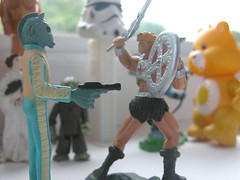


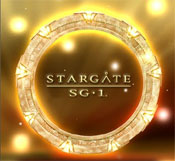 If they had made SG-1 a Marine or Army team, it just wouldn't have been the same. There sure as hell wouldn't have been any dramatic tension, nor any wise-cracking.
If they had made SG-1 a Marine or Army team, it just wouldn't have been the same. There sure as hell wouldn't have been any dramatic tension, nor any wise-cracking. For all the muted colors, shaky-cam action and tribal music, it's still a primetime soap opera, albeit a very good one.
For all the muted colors, shaky-cam action and tribal music, it's still a primetime soap opera, albeit a very good one.